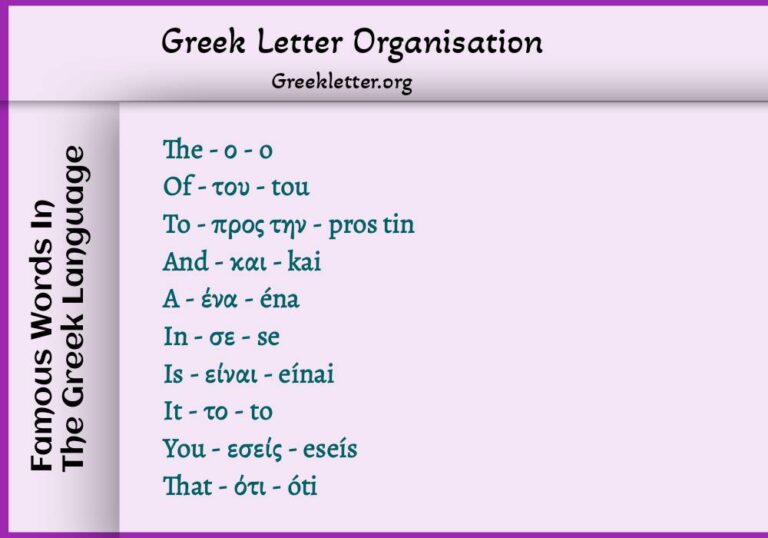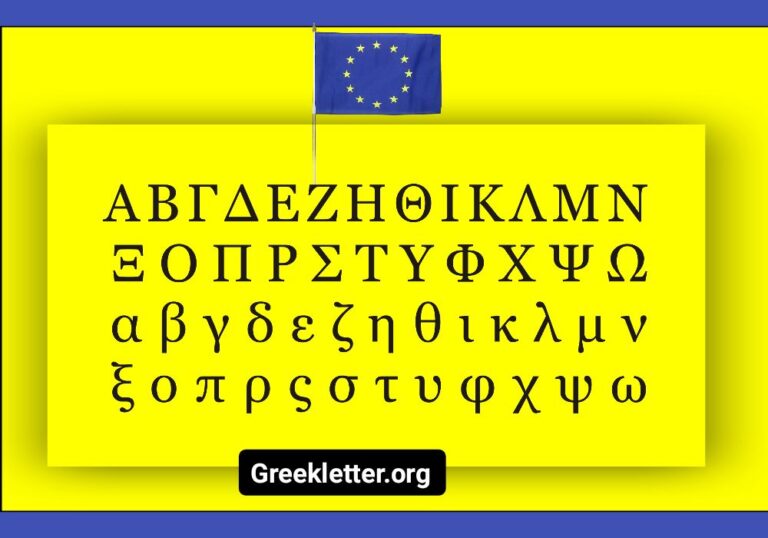How To Say Hello And Thank You In Greek
Have you ever found yourself in a situation where you desperately wanted to greet someone or express gratitude in Greek but had no idea how? Well, worry no more!
In this article, we will guide you through the art of saying hello and thank you in Greek. Whether planning a trip to the beautiful islands of Greece or simply wanting to impress your Greek friends, mastering these basic greetings is essential.
So grab a pen and paper because, by the end of this article, you can confidently say hello and thank you in both spoken and written form. Let’s dive into the enchanting world of the Greek language!
How To Say Hello And Thank You In Greek
Here’s how to say “Hello” and “Thank you” in Greek, along with pronunciation details:
Hello:
- In Greek, there are different ways to say “Hello” depending on the level of formality and the context:
- Γειά σου (Geiá sou) – Informal Hello:
- Pronunciation: yeh-AH soo
- Usage: This is an informal and friendly way to say “hello” to someone you know well or who is of the same age group. It’s similar to saying “Hi” in English.
Χαίρετε (Chaírete) – Formal Hello:
- Pronunciation: kheh-REH-teh
- Usage: “Χαίρετε” is a formal and polite way to say “hello” in Greek. It’s used when addressing strangers, elders, or in professional and formal settings.
Thank You:
- In Greek, there are different ways to express gratitude, depending on the level of formality and the situation:
- Ευχαριστώ (Efcharistó) – Standard Thank You:
- Pronunciation: ef-kha-ree-STOH
- Usage: “Ευχαριστώ” is the standard and versatile way to say “thank you” in Greek. It’s suitable for most situations, both formal and informal.
Σας ευχαριστώ (Sas efcharistó) – Formal Thank You:
- Pronunciation: sahs ef-kha-ree-STOH
- Usage: “Σας ευχαριστώ” is a more formal way to express gratitude. It’s used in formal and polite settings or when addressing multiple people.
Σ’ ευχαριστώ (S’ efcharistó) – Informal Thank You:
- Pronunciation: sef-kha-ree-STOH
- Usage: “Σ’ ευχαριστώ” is an informal and friendly way to say “thank you” to someone you know well. It’s similar to saying “Thanks” in English.
When saying “Ευχαριστώ” or its variations, it’s common to accompany the expression with a smile and a polite demeanor. These phrases are appreciated in Greek culture, and showing gratitude is considered courteous.
How To Say Hello And Thank You In Greek Letters
Here’s how to write “Hello” and “Thank you” in Greek using Greek letters:
Hello:
- Hello in Greek: “Γειά σου” (Geiá sou) for informal situations.
- Formal Hello in Greek: “Χαίρετε” (Chaírete) for formal settings.
In Greek script:
- Hello in Greek (Γειά σου): Γειά σου
- Formal Hello in Greek (Χαίρετε): Χαίρετε
Thank You:
- Thank You in Greek: “Ευχαριστώ” (Efcharistó) for standard thanks.
- Formal Thank You in Greek: “Σας ευχαριστώ” (Sas efcharistó) for more formal situations.
- Informal Thank You in Greek: “Σ’ ευχαριστώ” (S’ efcharistó) for informal thanks.
In Greek script:
- Thank You in Greek (Ευχαριστώ): Ευχαριστώ
- Formal Thank You in Greek (Σας ευχαριστώ): Σας ευχαριστώ
- Informal Thank You in Greek (Σ’ ευχαριστώ): Σ’ ευχαριστώ
These Greek phrases are written in the Greek alphabet. You can use this script to write and recognize the words when communicating in Greek.
How To Say Hello In Greek
In Greek, there are several ways to say “hello,” depending on the level of formality and the context of the greeting. One common and informal way to say “hello” in Greek is “Γειά σου” (Geiá sou). Pronounced as “yeh-AH soo,” this friendly greeting is used when addressing someone casually or in a familiar setting, similar to saying “hi” in English. It’s often used among friends and people of the same age group.
For more formal situations or when addressing strangers or elders, the formal greeting “Χαίρετε” (Chaírete) is used. Pronounced as “kheh-REH-teh,” it’s a polite and respectful way to say “hello” in Greek. This greeting is suitable for professional settings when meeting someone for the first time or showing respect to someone of higher status or authority.
So, in a casual or formal situation, you can use these Greek greetings to start a conversation and show respect for the person you’re addressing.
How To Say Hello And Thank You In Greek Audio
Click the play button below to listen to the audio on how to say hello and thank you in Greek.
In Greek, saying hello is as simple as saying Γεια σου (pronounced: you soo) for hello when addressing one person or Γεια σας (pronounced: ya sas) for hello when addressing multiple people or showing respect. It’s always a good idea to greet someone with a warm smile and eye contact, regardless of the language.
When expressing gratitude in Greek, the word ευχαριστώ (pronounced: ef-ha-rees-to) is commonly used. This versatile term can be translated as both thank you and thanks.
Gratitude is an important cultural value in Greece, so don’t hesitate to use this expression when someone helps or does something kind for you.
Whether a small act of kindness or a big favor, expressing your thanks will always be appreciated. Listen carefully to the audio clip below to hear the proper pronunciation of these essential Greek phrases. Practice them repeatedly until they roll off your tongue effortlessly!
How To Say Hello And Thank You In Greek Pronunciation
Certainly! To pronounce “Hello” in Greek, you can use “Γειά σου” (Geiá sou) for informal situations, which is pronounced as “yeh-AH soo.” This is an informal and friendly way to greet someone, similar to saying “hi” in English.
For formal occasions or when addressing strangers or elders, you can use the formal greeting “Χαίρετε” (Chaírete), pronounced as “kheh-REH-teh.” This polite greeting is suitable for professional settings or when showing respect to someone of higher status or authority.
To pronounce “Thank You” in Greek, the standard expression is “Ευχαριστώ” (Efcharistó), pronounced as “ef-kha-ree-STOH.” This is a versatile way to express gratitude, suitable for most situations.
In more formal contexts, you can use “Σας ευχαριστώ” (Sas efcharistó), pronounced as “saas ef-kha-ree-STOH,” which is a more formal expression of thanks. In informal settings among friends, you can say “Σ’ ευχαριστώ” (S’ efcharistó), pronounced as “sef-kha-ree-STOH,” which is a friendly way to say “thank you.”
These pronunciation tips will help you effectively greet others and express gratitude in Greek, whether casual or formal.
Discover All Greek Greeting Words and Phrases
Here’s a list of Greek greeting words and phrases:
Greetings:
- Χαίρετε (Chaírete) – Hello (formal, polite)
- Γειά σας (Geiá sas) – Hello (formal, polite)
- Γειά σας κύριε/κυρία (Geiá sas kýrie/kiría) – Hello, sir/madam (very formal)
- Γειά σου (Geiá sou) – Hi, Hello (informal, friendly)
- Γειά σας όλοι (Geiá sas óloi) – Hello, everyone (formal)
- Γεια σας παιδιά (Geia sas paidia) – Hello, kids (informal)
- Καλημέρα (Kaliméra) – Good morning
- Καλησπέρα (Kalispéra) – Good evening
- Καληνύχτα (Kaliníkhta) – Good night
- Καλό πρωί (Kaló proí) – Good day
- Καλό απόγευμα (Kaló apógevma) – Good afternoon
- Χαιρετίσματα (Chairetísmata) – Greetings
Farewells:
- Αντίο (Andío) – Goodbye (standard)
- Εις το επανιδείν (Eis to epanidín) – Until we meet again
- Γειά σας (Geia sas) – Goodbye (formal)
- Γειά σου (Geiá sou) – Goodbye (informal)
- Καληνύχτα (Kaliníkhta) – Goodnight (when parting in the evening)
- Καλό απόγευμα (Kaló apógevma) – Good afternoon (when parting in the late afternoon)
- Καλή επιτυχία (Kalí epitychía) – Good luck (when parting)
- Πάντα καλά (Pánta kalá) – Take care (informal farewell)
These Greek greetings and farewells cover various levels of formality and are used in different contexts. You can choose the appropriate one based on the situation and your relationship with the person you are addressing.
Conclusion Points
In conclusion, learning to say hello and thank you in Greek can be a fun and rewarding experience. By mastering these basic greetings, you can easily connect with Greek-speaking individuals and show appreciation for their culture.
Whether you learn through audio resources or by studying the Greek alphabet, various methods are available to help you become proficient in these greetings. So why not start today?
Take the first step towards expanding your language skills and immerse yourself in the rich world of Greek culture. Say hello and thank you in Greek, and open doors to new friendships and opportunities!
FAQs
1. How do you say hello in Greek?
– The word for hello in Greek is γεια σου (pronounced yah-soo) when addressing one person and γεια σας (pronounced yah-sas) when addressing multiple people.
2. What is the Greek phrase for saying thank you?
– The phrase for saying thank you in Greek is ευχαριστώ (pronounced ef-ha-rees-toh).
3. Do you have an audio pronunciation guide for saying hello and thank you in Greek?
– We provide an audio pronunciation guide for saying hello and thank you in Greek. You can find it on our website.
4. Can audio lessons teach me how to say hello and thank you in Greek?
– Absolutely! We offer audio lessons where you can learn how to say hello and thank you in Greek and other useful phrases.
5. Are there any other common greetings in Greek besides hello?
– Yes, apart from the basic greeting of hello, Greeks commonly use expressions like καλημέρα (pronounced ka-lee-meh-ra) meaning good morning, or καλησπέρα (pronounced ka-li-spe-ra) meaning good evening.
6. Is it important to know basic greetings in the local language while visiting Greece?
– Yes, knowing basic greetings shows respect and can help establish a friendly connection with locals during your visit to Greece.
7. Can I use these greetings interchangeably with everyone I meet?
– It is generally acceptable to use these greetings with most people you meet in Greece, but remember that formal situations may require more polite forms of address.
8. Do regional variations or dialects affect how hello and thank you are said in Greek?
– Greece has various regional dialects that may slightly alter the pronunciation or use of greetings. However, the basic hello and thank you phrases mentioned earlier are widely understood nationwide.






